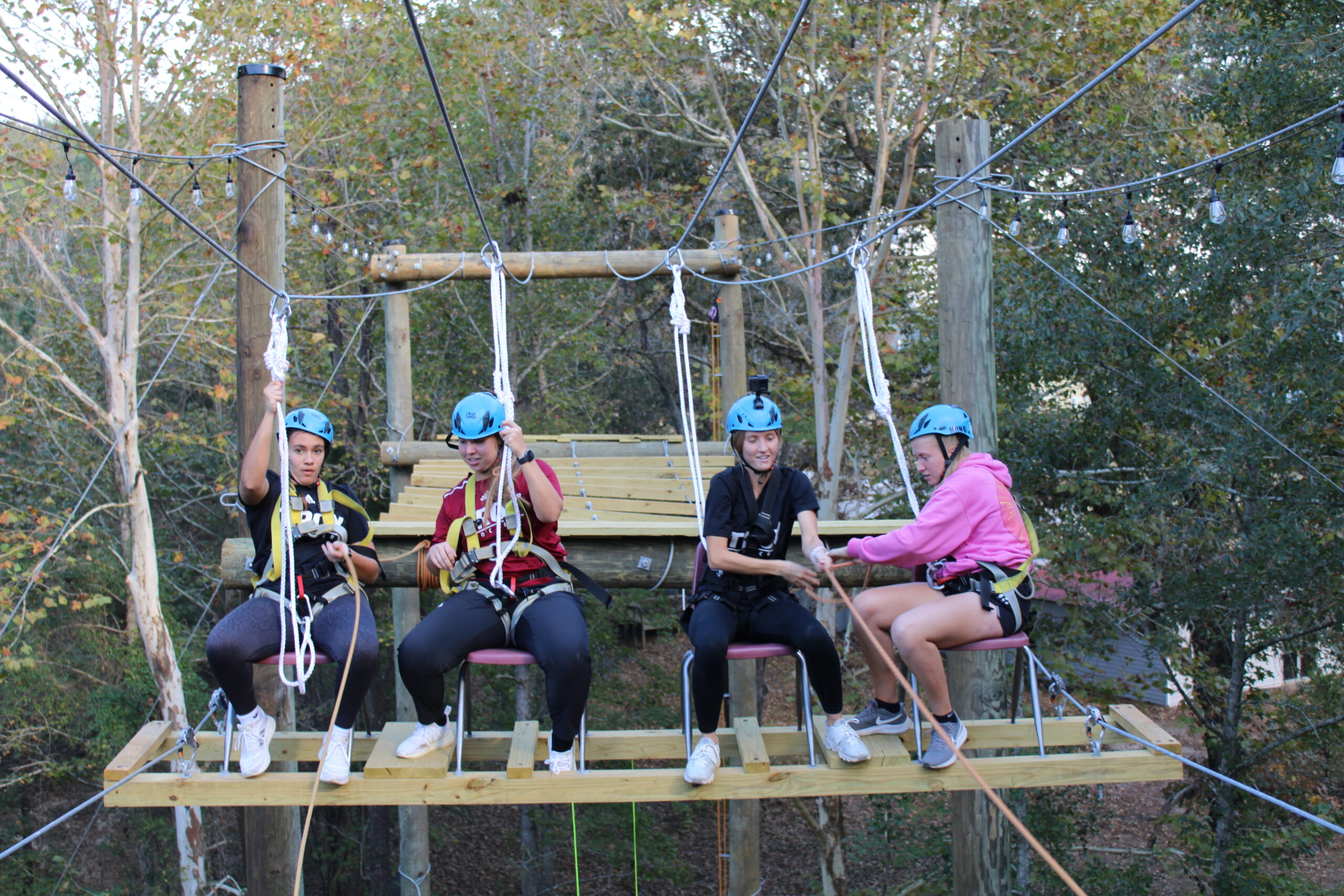Unlock Your Team's Potential with a Dynamic Challenge Course in Alabama
Unlock Your Team's Potential with a Dynamic Challenge Course in Alabama
Blog Article
Discover the Power of Cooperation With a Group Difficulty Program Journey
Getting started on a group difficulty program experience can offer a distinct chance for people to witness firsthand the transformative impact of collaboration within a team setting. As teams navigate through different challenges and jobs, real power of team effort unfolds, exposing the potential for improved communication, tactical preparation, and friendship (Team Challenge Course in Alabama). By taking part in these experiential knowing settings, individuals exist with a system to check out the midsts of their collaborative capacities and uncover brand-new methods to conquer difficulties jointly
Advantages of Group Challenge Courses
Engaging in group obstacle courses fosters cooperation and enhances interaction abilities among participants. One considerable benefit of getting involved in team difficulty training courses is the improvement of synergy skills.
Additionally, team difficulty programs also help in developing management abilities. As individuals encounter different obstacles throughout the course, individuals frequently naturally tackle leadership functions based upon their abilities and strengths (Team Challenge Course in Alabama). This hands-on experience enables them to practice decision-making, analytical, and delegation within an encouraging setting
Furthermore, these training courses promote trust and friendship among team members. By counting on each various other to get rid of barriers, individuals build depend on and create more powerful connections. This sense of camaraderie extends past the course, favorably impacting synergy and cooperation in numerous settings, consisting of the work environment.
Enhancing Group Communication Skills
In the context of group obstacle training courses, the development of reliable group interaction skills plays a crucial duty in maximizing collaborative efforts and achieving shared goals. Clear and concise interaction is essential for groups to effectively navigate the difficulties presented in these programs. By enhancing interaction skills, group participants can convey their concepts, pay attention proactively to others, give responses constructively, and coordinate their actions effectively.
Effective interaction promotes a helpful setting where team members feel comfortable sharing their ideas, asking for help when needed, and providing aid to their peers. It assists in constructing trust among staff member, which is essential for smooth cooperation and analytical. Furthermore, improved interaction lowers the possibility of misunderstandings, conflicts, and errors that can develop when messages are unclear or misinterpreted.
Through group difficulty programs that highlight communication skills, individuals can practice different forms of communication, such as spoken, non-verbal, and active listening. These experiences not just boost team effort throughout the program yet additionally supply useful skills that can be moved to the participants' personal and expert lives.
Approaches for Efficient Collaboration
What are the vital methods that cultivate efficient collaboration among group members in tough environments? One important method is developing open lines of interaction where group members really feel comfortable revealing their ideas, worries, and responses.

Setting clear objectives and assumptions is likewise crucial for reliable cooperation in difficult settings. When staff member recognize what is expected of them and have a clear roadmap to comply with, they can straighten their efforts towards a common goal. On a regular basis reviewing development, offering constructive responses, and making required changes along the road are vital components of effective collaboration in challenging atmospheres.
Conquering Obstacles With Each Other
To efficiently navigate and dominate challenges as a natural system, groups should use the strategies for efficient partnership refined in challenging settings. When encountered with challenges throughout a team challenge program journey, people need to come together, attracting upon each group member's toughness to conquer the difficulties collectively.
In addition, team effort is important for conquering challenges together. Each staff member brings a distinct viewpoint and capability to the table, enabling a varied variety of analytic techniques. Urging inclusivity and valuing each staff member's contributions cultivates a sense of unity and improves spirits, ultimately bring about even more effective barrier overcoming. Through cooperation, shared duty, and an encouraging team dynamic, teams can browse challenges with self-confidence and arise more powerful and extra joined beyond.

Building Trust and Sociability
Establishing a foundation of count on and friendship among employee is crucial for fostering a collaborative and helpful environment for getting over challenges with each other. Trust forms the basis of effective interaction, enabling staff member to feel safe revealing their concepts, problems, and advice responses. When people trust each other, they are most likely to work together freely, share resources, and job in the direction of usual objectives. Sociability, on the other hand, strengthens the emotional bonds within a team, bring about boosted morale, commitment, and a feeling of belonging.
Structure count on and camaraderie typically involves appealing in shared experiences that require team effort, interaction, and common support. Team difficulty training courses offer an exceptional chance for teams to bond through dealing with physical and psychological barriers with each other. These experiences develop long lasting memories and inside jokes that reinforce the group's unity and cohesion. By spending time and initiative into activities that promote count on and camaraderie, groups can establish a strong foundation that enhances their capacity to collaborate effectively and attain success.
Verdict
To conclude, group obstacle training courses use numerous advantages for enhancing interaction abilities, developing reliable collaboration methods, conquering barriers together, and building trust fund and friendship among staff member. By taking part in these journey programs, teams can strengthen their connections, enhance their analytical capabilities, and interact a lot more efficiently towards usual goals. Partnership is an effective tool that can result in higher success and communication within a team.

Team obstacle courses give a superb opportunity for teams to bond Team Challenge Course in Alabama through dealing with psychological and physical challenges together.In final thought, group challenge programs offer many benefits for enhancing interaction abilities, creating reliable cooperation techniques, overcoming barriers with each other, and structure depend on and sociability amongst team participants.
Report this page